Barbie Movie Review
"Barbie", one of the most anticipated films of 2023, is one of the most marketed productions of recent years. So, was the "Barbie" movie worth all this talk? What does “Barbie” actually mean? We examined the movie "Barbie" in detail, from its acting to its story and cinematography.
What is the Plot of the Movie "Barbie"?
Directed by Greta Gerwig and written by Noah Baumbach, the movie "Barbie" centers on Barbie, who lives in Barbie Land and can no longer adapt to the perfection of both her body and her universe for a reason she cannot understand. Barbie embarks on an adventure in the real world to fix the "flaws" that she has to face for the first time, and Ken accompanies her on this journey.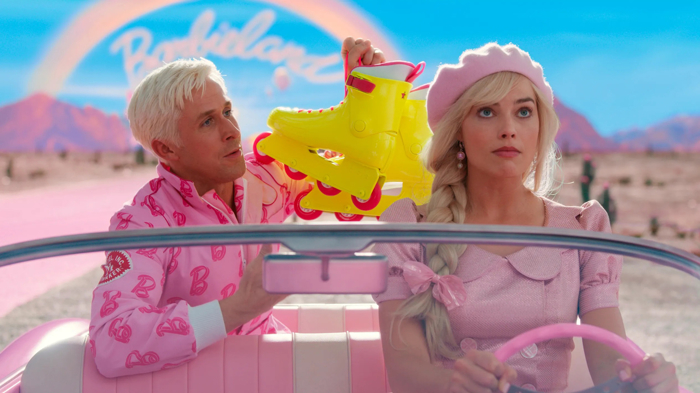
What Does the Movie "Barbie" Say?
The movie "Barbie" is a satirical production with both comedy and satire. Moreover, he is very clear about what he is criticizing and does not want this to go unnoticed by any viewer. There is a wide range of criticism, from the perception of perfection to the position of women in both traditional and modern society and capitalism. Moreover, doing all of this through the Barbie doll, which we can say is the perfect representation of all of them, requires more courage than one might think. Because when you bring to light the thing you criticize, you also advertise it. It is necessary to clearly distinguish the line between the values that Barbie advocates, "contributing to society and women", and the situation of "imprisoning women in certain physical and social stereotypes", which has been criticized by many circles for years, and neither of them should be ignored. The film does this in a precise way and even by expressing it through the characters' mouths. They openly say, "We praise the positive aspects of Barbie and all the ideas behind it, but we also criticize the aspects that need criticism."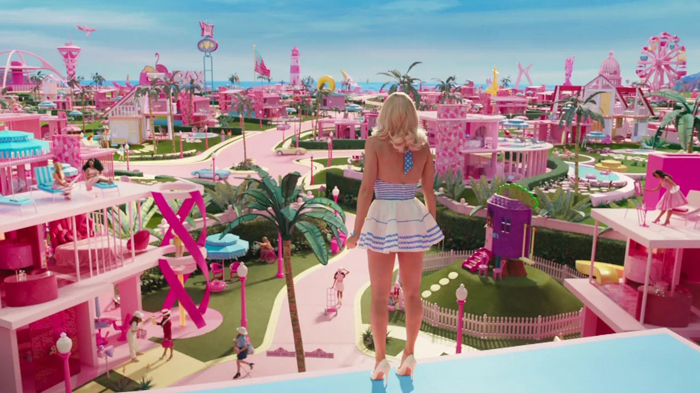
That's exactly why we put the stereotypical Barbie at the center of the movie - as the movie explains; When Barbie is mentioned, the first thing that comes to everyone's mind is the standard Barbie, which is a very logical idea. As we see in the movie, there are many Barbie types in the toy series, such as Doctor Barbie, President Barbie, Writer Barbie, Athlete Barbie. However, at the center of the film, it is the stereotypical, standard Barbie who falls into existential questions. In other words, the first woman produced, the most classic, the one we know best, the first step towards perfection, the most fundamental woman... Barbie's perfect body patterns, the perception of "the woman she should be" and all this cultural pyramid are new because they started with this stereotypical Barbie. the first steps of a transformation were taken by him; It is significant that the first questions and doubts arise in his mind. For this reason, it becomes even more internalizable to watch Barbie reluctantly embark on a journey of self-discovery and the cause of her "flaws."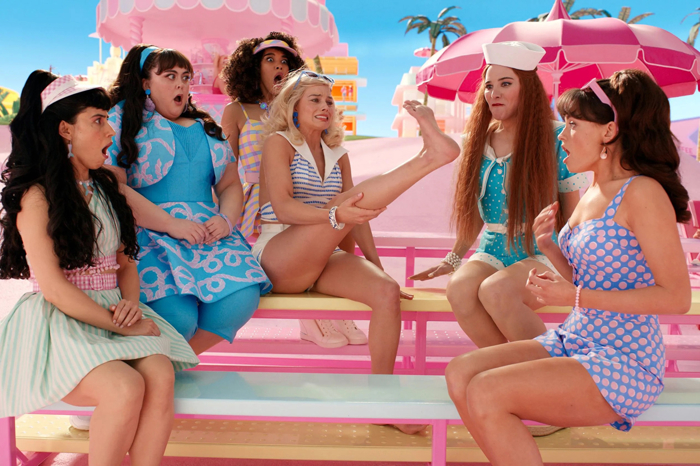
"Barbie" Movie and Feminism:
At the end of this journey, no one is trying to change Barbie, she chooses to change herself and makes an effort and takes steps for this. The reason he wants to change is not because he thinks he is wrong or broken, but simply because he wants to change. Of course, throughout his journey he realizes that many of the things he thought were true do not actually reflect reality; She realizes that being perfect is not what makes her who she is and that it is not a necessity as she thought. However, no one pushes him to change, no one imposes an idea on him, no one saves him, no one forces him to take action. His change happens completely at his own will, in his own time and in his own way. This is probably the most feminist thing in the movie. Because ideologies such as feminism can be interpreted differently both in society, on the internet and in works of art. It is sometimes shown that feminism can be achieved by belittling men and elevating women. Sometimes we are exposed to themes such as feminism should be like this and you should be like this to be a "right woman". However, when we watch a movie, seeing our main character, regardless of gender, grow, mature, and if there is to be a change, experience it without anyone imposing an idea on him, it is much more constructive in terms of us feeling the change he is going through and embracing the idea presented. So, can Barbie herself be a feminist icon, as she is advertised and desired to be?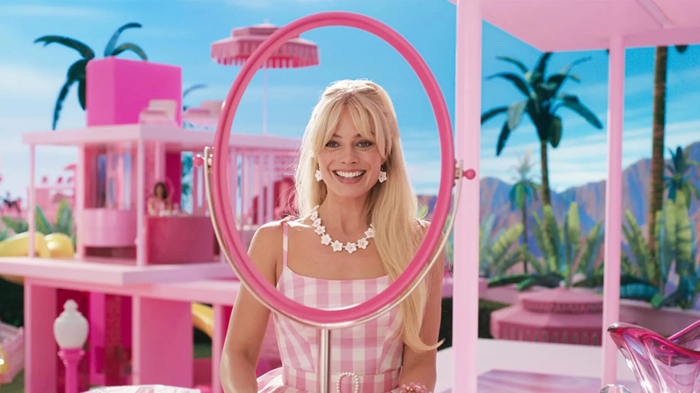
The Story of Barbie Doll:
Barbie doll, which was first released in 1959, has become one of the best-selling toys in the world since the 90s. As her story is told in the movie "Barbie"; Previously, toys for girls were only possible with dolls in which they could take on the role of mothers. For children who were introduced to an adult-looking toy thanks to Barbie, being a mother was no longer their only role while playing. Because Barbie has now become a friend, a role model who can accompany them in their imagination. Although she essentially had a visionary starting point, over time Barbie turned into a teacher who very sharply drew the perception of the "perfect woman" in children's minds: A tall, thin woman, always with make-up, always with her hair done, always looking good. For this very reason, it has been subject to a lot of criticism over time. On the other hand, because Barbie follows a vision that chooses to embrace social and cultural changes rather than reject them, Barbie has undergone many transformations over time and we have begun to see her not only as a beautiful woman. We met Barbies who do sports, write, work, have hobbies, study or give. Barbie had assets such as her own house and car, creating a strong figure as an individual. We started to meet Barbies of different body types. Now shorter Barbies and Barbies of different ethnicities have been produced. Most importantly, Barbies of important public figures, from Rosa Parks to Ella Fitzgerald, from Florence Nightingale to Helen Keller, began to be produced, and thus Barbie began to become a role model for young children, especially girls, as she claimed. . But of course, it is up to the consumer to discuss how active a role these transformations play in contributing positively to social and cultural change.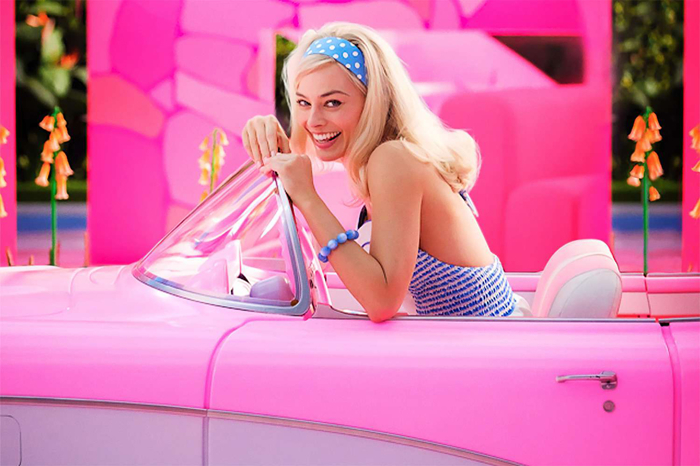
Margot Robbie in the Movie "Barbie":
If we need to talk about the acting of "Barbie"; We need to start the topic with Margot Robbie, the leading lady of the movie. If Margot Robbie had brought this iconic character to life in a much different Barbie movie, all she would probably have to do would be to look beautiful. However, he has a much more challenging task in this movie; looking both plastic and organic at the same time. It must look plastic, because much of the film reflects, both intellectually and cinematographically, the plastic world of the doll they deal with. In other words, Margot Robbie not only needs to look beautiful, but also has to have plastic "perfection" in everything, from her gestures and facial expressions to her demeanor and demeanor. He definitely succeeded in this. Over time, the character breaks away from this perfection, at first he does not want this change, but eventually he accepts it. During this entire transition process, we see Margot Robbie gradually taking on an organic "imperfection". Her expressions are still conscious of being a doll, but more natural; The expressions in their gaze become more meaningful, and their body movements begin to take on softer shapes as the film progresses. In short, we can say that Margot Robbie, like Pygmalion's woman who turns from a statue into a human, reflects a Barbie who turns into a human in the best way possible. We should also add that the fourth wall-breaking joke made in the movie about how ironic Margot Robbie's beauty and the word "flaw" look together is absolutely appropriate.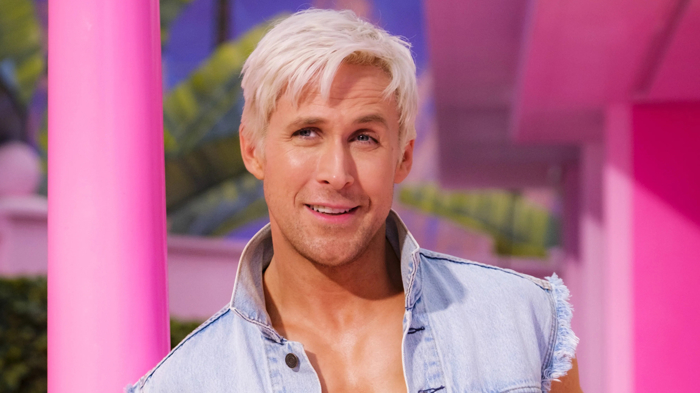
Ryan Gosling in the Movie "Barbie":
We see that Ryan Gosling, who plays Ken in the movie "Barbie", embraces the absurdity of his character with great pleasure. Ryan Gosling doesn't play just any Ken; He plays the "standard" Ken, presumably the first produced, in Barbie Land, which is the exact opposite of the real world. Kens are positioned in Barbie Land the same way women are positioned in the real world (probably the real world in the 50s). In the world ruled by Barbies, Kens have no home, no job, no expectations from life, in short, nothing. In this "perfect" world, Ken's only duty is to exist for Barbie. Ken is considered unnecessary as well as invisible without Barbie. Of course, the first thing Ken notices when he goes to the real world is how much respect men are here, and even how visible they are. Because, unlike the male-dominated world, Barbies dominate Barbie Land. Ken is not taken seriously in his own world, he cannot go beyond being a funny figure. Thus, in the movie, we watch a Ken who becomes corrupt rather than pure and funny, and we can see that Ryan Gosling embraces his role to the fullest. Ken, who was created to portray a cliché figure, adds depth to the character with small nuances at moments when he would be too superficial, and Ryan Gosling reflects these changes very well. He allows his character to embrace clichés but never become superficial. He is a funny, crazy, sometimes annoying, very absurd, sometimes pathetic, but definitely a character that we can relate to very easily (and even understand how everyone feels, regardless of gender) and is skillfully played by Ryan Gosling.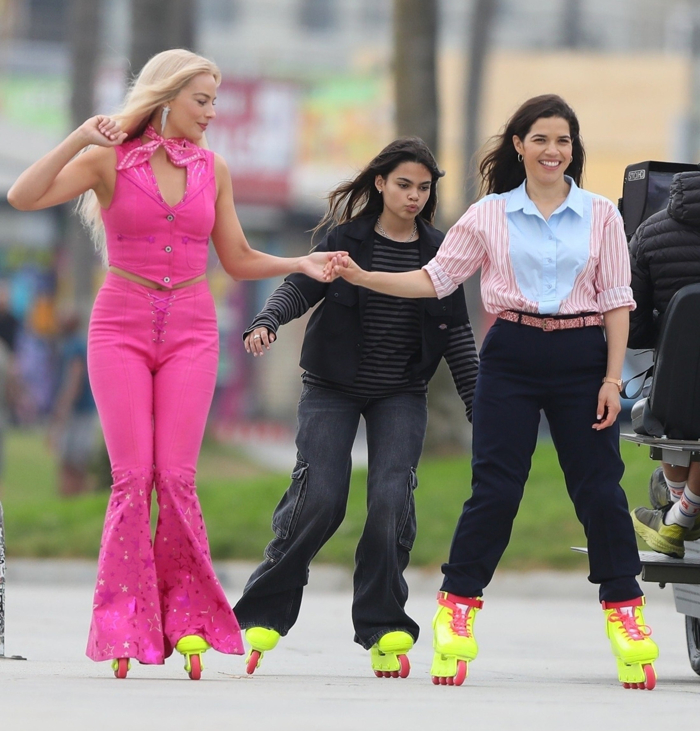
Script of the Movie "Barbie":
We can say that in the movie "Barbie" the story conveys the idea it wants to express in a tidy manner, without leaving any room for doubt. However, when it comes to details, it sometimes has repetitive ideas and scenes that make you feel like the movie is going on too long. In some places the jokes are quite appropriate and funny; In some places, you feel that some of the jokes of the movie were written targeting children, despite the age limit of 13.
Despite this, "Barbie" is a movie that knows what it is. In other words, it does not aim to be a festival film or an art film rather than a box office film, and it has no problems with that. Yes, he has a point and gives the message he wants to express, but he does not claim that it will not be a blockbuster movie with the aim of gaining a place in popular culture - which he has already achieved. This is exactly why we are watching a standard hero's journey story, just like in a classic Hollywood movie.
"Barbie" Movie and "2001: A Space Odyssey":
Of course, he does not neglect to make meta references and popular culture jokes for this purpose. References are made to many cult films, from "2001: A Space Odyssey" (1968) to 1999's "The Matrix". In fact, the fact that the opening scene of the film is an exact recreation of the opening scene of "2001: A Space Odyssey" says a lot about the self-confidence of our storytellers. Stanley Kubrick's cult film offers a deep examination of human history and human development through science fiction. The creators of "Barbie", Greta Gerwig and Noah Baumbach, also say from the very beginning that in this film, they will make an examination of human history and the social development of humans (and women) through Barbie. They say clearly, without beating around the bush, at the very beginning; Barbie is exactly what the monoliths that created modern humans were in the movie "2001: A Space Odyssey".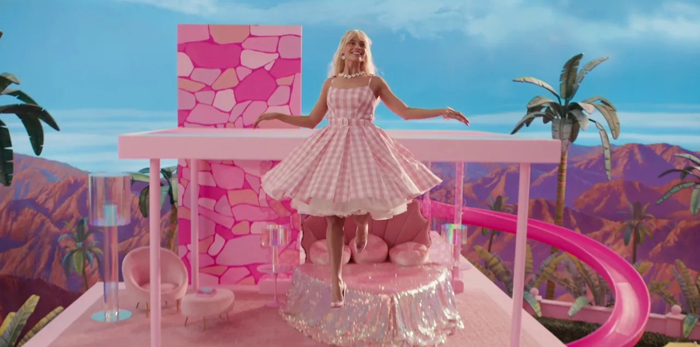
"Barbie" Movie and Clichés:
For this very reason, it is sometimes surprising that two screenwriters, who can convey the sentence they want to convey in a short and concise manner, give messages that repeat themselves as the film progresses, and convey these messages by the "making the character say" method, which is not a popular cinema language because it is easy to avoid. However, if we were to be the devil's advocate, we can think that every superficial dialogue, every cliché joke and characterisation, every didactic and blind-eye meaning in the movie was made consciously to reflect the spirit of the movie. Because the duo of Greta Gerwig and Noah Baumbach, in projects such as "Marriage Story" (2019), "Fraces Ha" (2012), "Lady Bird" (2017), "Little Women" (2019), which they signed separately and together, are interested in the story and characters. They are very masters of going into depth and giving their ideas in subtle ways rather than throwing them in the audience's face. This makes us think that every choice in the movie "Barbie" was made consciously. Barbie's plasticity and artificiality seem to be adopted as a theme and processed throughout the film, from the script to the images, from the acting to the editing and special effects.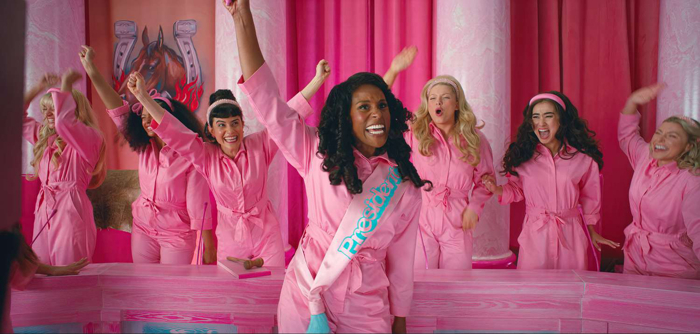
Direction of the Movie "Barbie":
Greta Gerwig is a director who has proven herself both in independent productions and big-budget Hollywood films. Being one of the most remarkable young directors of our time is both a great success and a great responsibility. Each production is expected to be better than the last and you are expected to always raise your standard. It is a fact that when you cannot meet this, you are criticized much more than many average directors. The fact that "Barbie" is one of the most advertised movies of recent years, the name Greta Gerwig and the star cast raise this expectation. For all these reasons, we enter the movie "Barbie" with already established positive and negative prejudices. We expect "Barbie" to either be a terrible movie and a disappointment, or a masterpiece. Neither happens, which is a success because it doesn't mean that "Barbie" is an average box office movie. With both positive and negative aspects, "Barbie" is an above-average box office movie. Unfortunately, it is a production that is more open to negative criticism than many box office films in terms of the size of its advertisement, its subject and the theme it deals with. However, when we try to look for a reason, it is a project full of meaning and we can find justification for many of its features that seem like mistakes. I say why when we try to look for it because when we try to comment "too cliché" on a character's behavior, sentence or a situation, our director Greta Gerwig comes up with many cinematographic features, from starry special effects that we can call "cheap looking" to flight scenes that could be criticized for their simplicity in a completely different movie, and exaggerated art direction. The choice already tells us that this is the purpose. As we said when talking about the acting, Barbie's plasticity, that is, the themes she represents such as "unnatural", "exaggeration" and "fakeness", are woven throughout the film. Normally we can use it when criticizing a movie; Concepts such as cliché, didactic, kitsch, exaggeration, and simplicity are not a result in the "Barbie" movie, but a tool.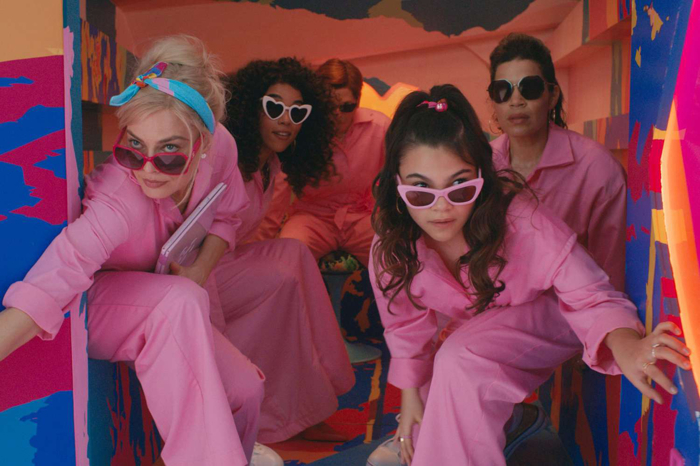
I tried to briefly explain the Barbie movie to you, I hope you like it, thank you.






































